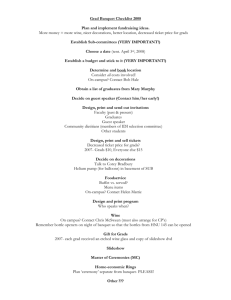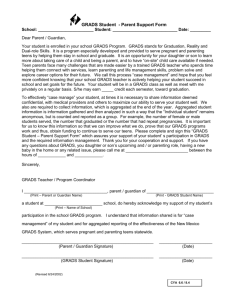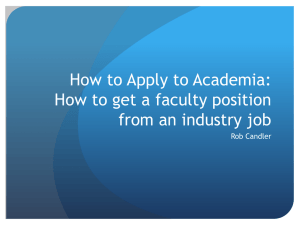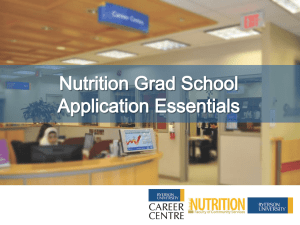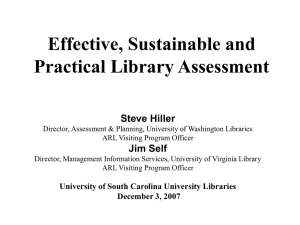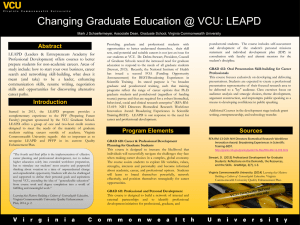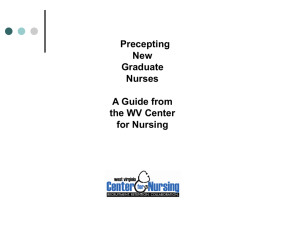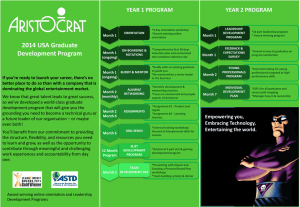Robin Devey - WINN-NTF
advertisement
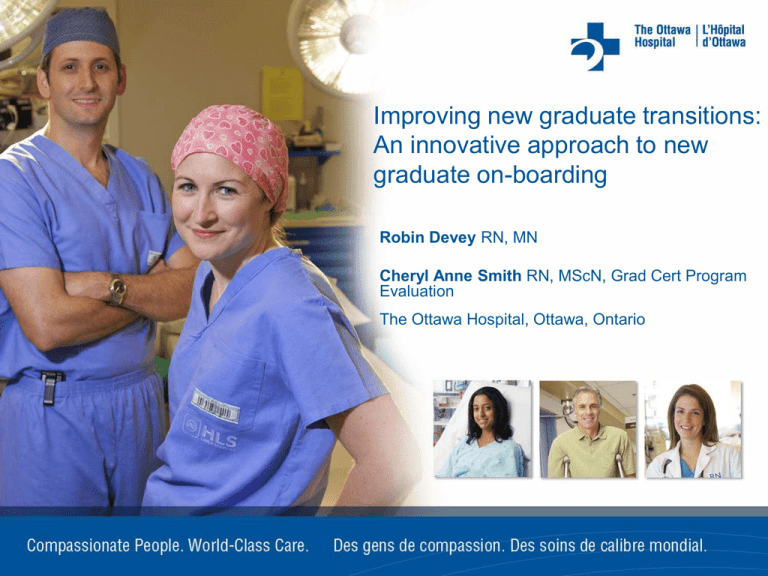
Improving new graduate transitions: An innovative approach to new graduate on-boarding Robin Devey RN, MN Cheryl Anne Smith RN, MScN, Grad Cert Program Evaluation The Ottawa Hospital, Ottawa, Ontario Context • The Ottawa Hospital (TOH) is one of the largest academic health science centres in Canada -13,000 employees with 4,500 nurses • Nursing shortage predictions: - In Canada CNA (2009) predicted shortage of 60,000 RN’s by 2022 -In U.S. predicted shortage of 260,000 RN’s by 2025 (Buerhaus et al., 2009) Context • 30-60% New graduate Nurses leave their first employer within the first year • Turnover cost per nurses is $27,000 Canadian • Recognized new grads were dominant pool and that we needed to ensure low turnover Context • TOH needed to recruit over 522 nurses in 07-08 with 276 projected regional grads 619 nurses in 08-09 with 245 regional grads and 637nurses in 09-10 with 259 regional grads. 07-08 08-09 09-10 Nurses Required 522 619 637 Regional Grads 276 245 259 Out of region grads 246 374 378 New Grad Challenges • Transition from student to new grad is a “realty shock” • Transition phases: honeymoon, shock, recovery & resolution • Transition is a rite of passage with three phases: separation, transition & integration • Transitional challenges include: lack of preparation to live up to ideals, challenges of task vs. patient needs, focus on developing competencies vs. client autonomy & reluctant to consult with colleagues and participate in decision making New Grad Challenges • Transitional stressors include: lack of confidence in decision making, deficits in critical thinking and clinical knowledge, relationships with peers & preceptor, struggling with independence, frustrations with work environments, organization, setting priorities and communicating with staff • Transition shock as immediate, acute and dramatic stage occurring within first month • Interaction with colleges vital to successful integration New Grad Challenges • Sense of belonging linked to successful transition to new role • Need to feel connected to people in the organization or they may not stay long enough to try to fit in • Turnover reported up to 60% • 40% perceive lack of opportunities for future career development • Leave because they never feel welcomed or part of the organization New Grad Challenges • Frustrated by lack of care shown by staff • Demonstrate stress regarding competence, confidence, making errors & adjusting to new workplace environments • Complain of lack of support, problems with organization, completion of tasks & quality of work New Grad Challenges • Do not feel skilled, comfortable or confident for as long as one year after hire • New grads take at least one year to master a job New Grad Challenges • Want reassurance, specific and precise guidelines • Need to feel connected to people in the organization • Sense of belonging linked to their successful transition into their professional role Program Objectives • Provide supportive safe environment (on-boarding) • Ensure large numbers of new grads not “lost in their sheer number” • Increase new grad engagement / sense of belonging • Decrease new grad turnover On-boarding • Definition: approach combining people, process & technology to optimize impact new hire has on organization • Process that begins after hire, but before they “enter the door” • Key to personalized engagement • Studies indicate new hires more productive sooner and improves retention • Employee feels welcomed, valued and prepared for their new career On-boarding • Strategic on-boarding programs involve high levels of human interaction and tailored to individual’s needs • New grad face more drastic transition than those with experience • Newcomer adjustment consists of both task and social transition • 69% of hires stay after 3 years if well structured onboarding The Ottawa Hospital Approach • Created new nursing role -Responsible for connecting with nursing students / new grads -Attend college / university events -Maintaining contact with them throughout the hiring process -Following up with them to the end of their first year of employment -Wiki sites for new graduate resources and support for those who were unsuccessful writing their licensing exams. The Ottawa Hospital Approach • On boarding process includes: -Face to face meetings -Email and telephone contact -Meet & Greets -Group meetings -Social events Evaluation Methodology • Program Logic Model approach • Stakeholder engagement • Qualitative and quantitative data • Focus groups and follow up surveys • Outcomes and processes both evaluated and recommendations made which led to changes in the 08-09 program and continued in 09-10 as were well received. -main changes involved the method of communication about the program (holding open forum meetings and attending department/program meetings to review processes) as well as the interview process and allocation of new grads per clinical program. Evaluation Results • Turnover rate decreased and has remained low throughout this initiative • Hired over 220 new grads in 07-08, 08-09 & 09-10, an 86% increase over 06-07 • Survey and focus group results indicated overall satisfaction by new graduates and managers with the new approach Evaluation Results 100.0% 90.0% Follow up received 80.0% Meet and Greets 70.0% 60.0% On going support 50.0% 40.0% Manager support 30.0% Registration assistance New grads Registration assistance Managers 20.0% 10.0% 0.0% Satisfaction with program Results “Thank you so much for the good wishes. Now comes the long wait for the exam results…” “Thank you so much for those encouraging words! The exam was very challenging, but hopefully we were able to prove ourselves competent!” “Hey!! Things are going really well here. It’s been getting really busy so I am just loving it!” “Thank you so much for your e-mails. I really appreciate you taking the time to help and meet up with me/check up. It means so much! Looking forward to talking with you soon!” Lessons Learned • Change in practice • Confusion about the role and responsibilities • Timely communication challenging • Meet & greets so successful we ran out of room • Difficulties connecting with out of town hires to assist with HFO website registration Next Steps / New Challenges • Will continue with the personalized approach to new graduate on boarding • Will develop further resources to assist with new graduate engagement with the organization • Will continue to evaluate the program and solicit feedback from new grads and major stakeholders to further refine the program to meet the need of those involved Conclusion • Innovative approach to new grad on boarding has proven to be very successful • TOH recognized that needed to ensure new grads well connected to the organization to ensure we could provide quality care • We are assured that we are on the right track, connecting new grads to TOH, where they have career options for life
